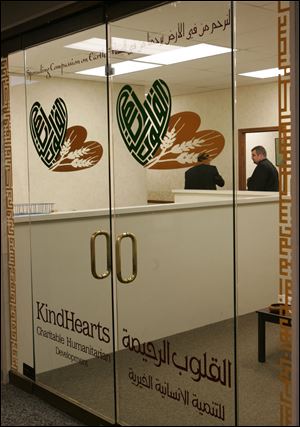
Charity taken off suspected terrorist list
Feds settle suit, agree to pay ex-Toledo group’s legal fees
5/2/2012
The KindHearts for Charitable Humanitarian Development Inc.'s office.
A West Toledo charity that officially disbanded in February after a years-long legal battle with the U.S. Treasury Department announced Tuesday that the parties have reached a settlement that includes removing KindHearts for Charitable Humanitarian Development Inc. from a list of suspected terrorist organizations.
The Muslim charity also will be paid attorney's fees and given the opportunity to distribute nearly $1 million in funds raised for humanitarian causes — donations that were blocked when federal agents targeted the organization in 2006 and froze its financial assets.
The three-page settlement agreement made public Tuesday resolves a 2008 lawsuit filed in U.S. District Court in Toledo that challenged the government's designation and requested that the freeze order be vacated.
More than four years later and after a series of legal wins for the nonprofit organization, KindHearts attorneys called the agreement a victory.
"This resolution has been a long time coming, but it is a tremendous victory for KindHearts and the essential principles of constitutional rule," said Toledo attorney Fritz Byers, who represented KindHearts.
KindHearts, founded in 2002, was, in effect, shut down when it was announced on Feb. 19, 2006, that the organization was under investigation by the Office of Foreign Assets Control, or OFAC, of the U.S. Treasury Department and would potentially be labeled a "specially designated global terrorist."
At the time, government officials cited the USA Patriot Act provision that authorizes assets to be frozen while an entity is investigated.
KindHearts' subsequent lawsuit challenged the process and claimed that by keeping its assets frozen, the government stymied the group's ability to defend itself.
In a 100-page order released in August, 2009, federal Judge James Carr, who has since moved to senior status, ruled that the government violated KindHearts' constitutional rights and agreed with the organization's assertions that it was denied due process and subjected to the unlawful seizure of its property.
Judge Carr's decision was lauded by KindHearts' attorneys, including those from the American Civil Liberties Union, who said the ruling stated clearly that the government could not circumvent the Constitution.
Mr. Byers said it was that ruling that eventually led to the settlement.
"Judge Carr's landmark ruling in 2009 established that the government's shutdown of KindHearts violated the charity's rights in the most fundamental ways," Mr. Byers said.
"With that ruling in place, the government agreed to remove KindHearts from the government's list of suspected terrorist organizations, to allow KindHearts to distribute the funds it raised to humanitarian causes consistent with its mission and its donors' intent, and to pay KindHearts' legal fees incurred in this six-year dispute.
"The result is a tribute to the enduring strength of our bedrock constitutional principles, which serve us, perhaps best of all, at times of supposed national crisis, and to the commitment of KindHearts' founders to the organization's charitable mission," he added.
As part of the settlement agreement, KindHearts must remain dissolved, although those involved in the organization are allowed to form a new organization "to engage in charitable activity in the Middle East or elsewhere."
According to the settlement, the parties "mutually desire to resolve all the claims" without further legal action or admission of liability or wrongdoing by either party.
Also listed among the conditions is that "all funds and assets owned by KindHearts will be expended, pursuant to licenses by the Office of Foreign Assets Control, to cover KindHearts' outstanding financial obligations and as grants for charitable purposes to charitable organizations."
The Treasury Department issued a statement noting that as part of the settlement, the government had issued a license authorizing KindHearts "to, after making certain payments to satisfy outstanding obligations to creditors, distribute the organization's blocked funds to three internationally recognized nongovernmental organizations involved in humanitarian work."
"Once the funds are fully disbursed, KindHearts will formally dissolve, cease operations, and close down. OFAC will then lift the order blocking KindHearts' property pending investigation and remove KindHearts' name from the List of Specially Designated Nationals and Blocked Persons," the statement read. "This resolution ensures that KindHearts will not be able to resume the activities that resulted in its property being blocked, and that its property will not be used for illicit purposes."
Jihad Smaili, a KindHearts board member and attorney who since has relocated to California, noted in a telephone interview that as part of the settlement, the government agreed to pay $330,000 as reasonable attorneys' fees to the organization.
He said this provision shows that "they pretty much admit doing something wrong."
"It's a bittersweet moment for the KindHearts organization. KindHearts is effectively dead because the government has forced it to languish for six years," he said, noting that the name has been tarnished by what turned out to be nothing more than an unproven allegation.
"…There is a sense of closure because now we know that the government threw its hands up and said, ‘You're right, we shouldn't have done this.'?"
Mr. Smaili recounted how in the days and weeks after the organization's shutdown, he repeatedly tried to learn what evidence had been collected about the group's alleged affiliation with a militant-terrorist group.
He said KindHearts was not allowed access to any information, including the group's own seized documents or its funds to hire attorneys.
Instead, he said, the KindHearts name was stained by government officials who accused it of terrorist allegiances without offering any proof. And what had become among the nation's largest Muslim charities was put out of business.
Mr. Smaili said that the settlement does allow the organization to fulfill its obligations to donate money where it was intended.
Although initially collected for Pakistan earthquake relief, the money will be used to help provide food, school supplies, and medicines to those in need in Pakistan, the Gaza Strip, and the West Bank, he said.
Contact Erica Blake at: eblake@theblade.com, or 419-213-2134.